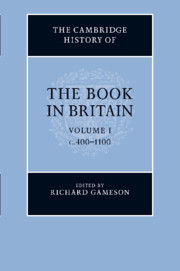Book contents
- Frontmatter
- 1 From Vindolanda to Domesday: the book in Britain from the Romans to the Normans
- PART I THE MAKING OF BOOKS
- PART II THE CIRCULATION OF BOOKS
- PART III TYPES OF BOOKS AND THEIR USES
- PART IV COLLECTIONS OF BOOKS
- 27 Patrick, apostle of the Irish
- 28 The library of Iona at the time of Adomnán
- 29 Literacy in Anglo-Saxon England
- 30 Aldhelm’s library
- 31 The library of the Venerable Bede
- 32 The library of Alcuin’s York
- 33 The library of Cynewulf
- 34 King Alfred and his circle
- 35 Ælfric’s library
- 36 The library of Byrhtferth
- 37 The library of Wulfstan of York
- 38 Rhygyfarch ap Sulien and Ieuan ap Sulien
- PART V CODA
- Bibliography
- Concordance of named manuscripts
- Index of manuscripts
- General Index
- Plate 4.1: The Lindisfarne Gospels"
- Plate 5.1: The Lichfield/St Chad Gospels"
31 - The library of the Venerable Bede
from PART IV - COLLECTIONS OF BOOKS
Published online by Cambridge University Press: 28 March 2012
- Frontmatter
- 1 From Vindolanda to Domesday: the book in Britain from the Romans to the Normans
- PART I THE MAKING OF BOOKS
- PART II THE CIRCULATION OF BOOKS
- PART III TYPES OF BOOKS AND THEIR USES
- PART IV COLLECTIONS OF BOOKS
- 27 Patrick, apostle of the Irish
- 28 The library of Iona at the time of Adomnán
- 29 Literacy in Anglo-Saxon England
- 30 Aldhelm’s library
- 31 The library of the Venerable Bede
- 32 The library of Alcuin’s York
- 33 The library of Cynewulf
- 34 King Alfred and his circle
- 35 Ælfric’s library
- 36 The library of Byrhtferth
- 37 The library of Wulfstan of York
- 38 Rhygyfarch ap Sulien and Ieuan ap Sulien
- PART V CODA
- Bibliography
- Concordance of named manuscripts
- Index of manuscripts
- General Index
- Plate 4.1: The Lindisfarne Gospels"
- Plate 5.1: The Lichfield/St Chad Gospels"
Summary
In a letter written as the preface to his commentary on Genesis, addressed to Acca, bishop of Hexham (709–31), Bede listed the authors who had preceded him in commenting on the first book of the Old Testament – Basil, Ambrose, Augustine – and he observed of their writings:
But because these are so copious and lengthy that such a number of volumes may scarcely be acquired except by the very wealthy, and so profound that they may scarcely be understood fully except by the very learned, it has pleased your holiness to assign to me the task of gathering from all these, as if from the loveliest meadows of a widely blossoming paradise, such things as should seem to meet the needs of the weak.
In these words we can glimpse not only Bede’s idea of his own calling – as one of the very learned, with the skill to assimilate difficult and diffuse material and pass on its import to those less fortunate – but also his sense of privilege as a beneficiary of the wealth that brought so many books his way, creating a scholar’s paradise, as he saw it. Closer examination of his commentary on Genesis shows that the works mentioned in that letter to Acca were known to Bede not merely by reputation, but that copies of them lay open before him. Basil’s commentary in the translation from the Greek by Eustathius, Ambrose’s Hexaemeron, and several relevant works by Augustine (primarily his De Genesi ad litteram but also De Genesi contra Manichaeos, his Confessiones, and the treatise Contra adversarium legis et prophetarum) are just the authors and books which Bede himself named in describing his sources.
Keywords
- Type
- Chapter
- Information
- The Cambridge History of the Book in Britain , pp. 606 - 632Publisher: Cambridge University PressPrint publication year: 2011
- 2
- Cited by

